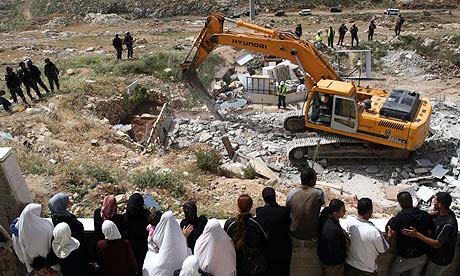HRW
September 27, 2013
Israeli military forces should cease actions in a West Bank Bedouin community that were apparently intended to displace the residents without lawful justification. The military demolished all homes in the community on September 16, 2013, and blocked four attempts by humanitarian groups to provide shelters, with soldiers using force against residents, humanitarian workers, and foreign diplomats on September 20. Under international humanitarian law in effect in the occupied West Bank, the deliberate unlawful forced transfer of a population is a war crime.
An Israeli court in August rejected a petition against military demolition orders by residents of Mak-hul and other Bedouin communities, on technical grounds. On September 24, more than a week after Mak-hul was demolished, the court temporarily suspended any further demolitions.
“The Israeli military should end its unjustified attempts to forcibly remove a decades-old community,” said Joe Stork, acting Middle East director. “Israeli forces didn’t just rough up diplomats, they demolished every single building in Mak-hul and ordered the residents to leave and never come back.”
Israeli forces demolished all 58 buildings in Mak-hul on September 16, displacing at least 48 residents, according to UN reports. The soldiers then blocked and confiscated two aid deliveries and demolished shelters built by another humanitarian group with the wreckage left over from the first demolitions, residents and humanitarian workers said.
Numerous witnesses said that on September 20, Israeli forces threw “sound bombs” – disorienting, non-lethal grenades that make a loud noise on impact – at diplomats and aid workers attempting to deliver tents and other aid. Israeli forces also assaulted two Bedouin residents, who were later hospitalized, arrested three, and confiscated the truck and its cargo, witnesses said.
On September 24, the Israeli High Court of Justice issued a temporary injunction, preventing the military from “transferring the [residents] from their village and demolishing the structures in the village,” unless demolitions were “required by imminent military needs and by clear operational security considerations.” The ruling gave the Israeli authorities until October 8 to show a valid legal cause to justify demolishing the structures in the community.
As well as halting all demolitions in Mak-hul, the Israeli military should permit humanitarian assistance, and allow the community to rebuild, Human Rights Watch said.
On August 25, the court had rejected a petition against the demolition orders in Mak-hul and in other Bedouin communities, ruling that the petitioners’ requests for building permits did not prove their connection to the land as required by Israeli military orders, and because not all of the petitioners shared a common legal claim. The ruling ordered the 21 petitioners to pay the Israeli authorities 10,000 Shekels (US$2,825).
Residents said that since September 16, military officials have repeatedly told them to leave and not return to the site of the community. Israeli forces’ blocking of humanitarian assistance into Mak-hul for more than a week has deprived residents of adequate shelter in the community and food for their sheep, on which their livelihoods depend in a desert environment.
The Fourth Geneva Convention prohibits “[i]ndividual or mass forcible transfers” of civilians within an occupied territory “regardless of their motive” except if carried out for the safety of civilians during hostilities or for imperative military reasons. Even when such forced transfer is permitted, it must be temporary and the residents allowed to return as soon as possible. Deliberatelyviolating this prohibition is a grave breach of the Geneva Conventions and is prosecutable as a war crime.
Israeli officials justify demolitions of Palestinian structures not for security reasons or the safety of the population but on the administrative grounds that the structures were built without building permits, in areas not zoned for residential construction.
Residents of Mak-hul said they had lived in the area since 1967, renting the lands from Palestinian landowners. In 2009, the Israeli military’s civil administration, which controls land use and planning in “Area C,” delivered “stop work” orders prohibiting any further construction in Mak-hul, residents said. Residents hired a lawyer in 2013, who notified them that the Israeli military said it had delivered demolition orders to them in 2012. But residents told Human Rights Watch that they had never seen the orders.
Human Rights Watch has documented cases in other West Bank communities in which the civil administration left demolition and stop-work orders on rocks or suspended from tree branches rather than delivering them to homeowners.
B., a resident of Mak-hul, said that the residents’ lawyer later obtained a 10-day delay on the demolitions, which expired at noon on September 16. However, B. said, “the army showed up here at 5:30 a.m. that day. By 10 a.m., they had finished destroying every single building.”
Three Mak-hul residents told Human Rights Watch that Israeli forces closed off the two intersections near Mak-hul, and entered the community with five four-by-four vehicles, several bulldozers, five military vehicles, and a military personnel carrier. One resident, Y., said that after demolishing his home, the forces left, but that an officer returned at 1:30 p.m. “and told us to leave the area and not come back, and then when I walked away from him and took my sheep to graze he followed me and threw a sound grenade at me.”

